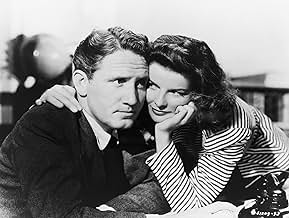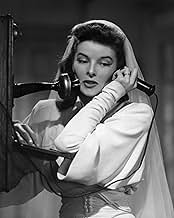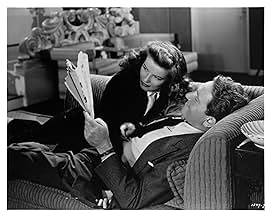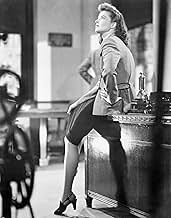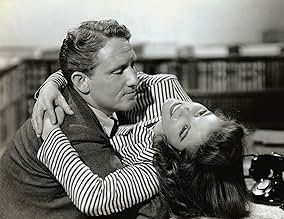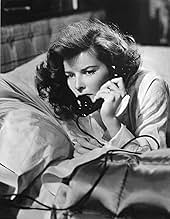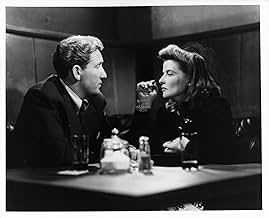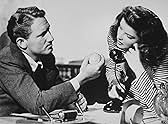Füge eine Handlung in deiner Sprache hinzuSportswriter Sam Craig and columnist Tess Harding, with the same New York newspaper, overcome their initial antagonism, fall in love and get married, only to find their relationship strained... Alles lesenSportswriter Sam Craig and columnist Tess Harding, with the same New York newspaper, overcome their initial antagonism, fall in love and get married, only to find their relationship strained when he comes to resent her hectic lifestyle.Sportswriter Sam Craig and columnist Tess Harding, with the same New York newspaper, overcome their initial antagonism, fall in love and get married, only to find their relationship strained when he comes to resent her hectic lifestyle.
- Regie
- Drehbuch
- Hauptbesetzung
- 1 Oscar gewonnen
- 5 Gewinne & 2 Nominierungen insgesamt
- Dr. Lubbeck
- (as Ludwig Stossel)
- Cab Driver
- (Nicht genannt)
- Stage Doorman
- (Nicht genannt)
- Phone Girl
- (Nicht genannt)
- Baseball Fan
- (Nicht genannt)
Empfohlene Bewertungen
This isn't to say that the film is without flaws. Far from it. The writing is clipped and most of the words on their own have little spark. (It takes Spencer Tracy's glowering eyes, or Katharine Hepburn's radiant smile, to add life to those words.) Even the relationship between Sam and Tess isn't set up in the most fluid of ways, leap-frogging from moment to moment, from scene to scene, without quite making the necessary connections--if you believe in Sam and Tess together (and I do), it's only because you can truly believe in Tracy and Hepburn together. The film occasionally feels like a play cobbled together from various scenes, until it hits its stride midway through the film (after Sam and Tess get married).
Script aside, the plot is interesting, and certainly quite radical for its time. However, the ending (a hilarious set-piece of comedy though it might be) leaves things largely unresolved. We have a wonderful, strong female character in Tess Harding--this is clear enough in the first half of the film. But her strength, her forceful personality and go-getting attitude, become her weakness in the second half, so much so that she becomes almost a caricature of the original Tess Harding. Some of the things she does (her 'humanitarian' wholesale adoption of Chris, for example; her rudeness and blithe ignorance of Sam's worth) are truly reprehensible, and the point the writers are making is clear--a female who tries too hard to be a male loses her feminity, and cannot ever really be fulfilled. In this sense, the gender politics, as other commenters have pointed out, is 'deplorable'.
And yet there is a grain of truth in it; if one *can* be brought to believe that Tess could really treat Chris and Sam in the way she does, one can't help but applaud Sam's decision to leave. The role reversal is almost complete--Sam himself comments on the fact that she 'makes love' to him to smooth over their quarrels. She charges on her own merry way without asking him about his life, his opinion, or anything that remotely matters to him. Their union was neither perfect, nor a marriage, as he justifiably charges.
The uneasy tension between the admirable and the deplorable Tess Hardings comes at the end: you most certainly get the impression that the film itself didn't quite know whether or not to affirm the Tess character. In fact, by all accounts (even Hepburn's own), the film originally ended with an unqualified affirmation of Tess's character--promising to be more involved in her husband's life, Tess is depicted at a baseball game, cheering alongside Sam, getting louder and louder and rising higher in her seat above him. It was both an affirmation of Tess the character, and a lingering question mark about the Harding-Craig reunion.
Test audiences didn't like it. (Apparently, it was the *women* who felt threatened by the character Hepburn portrayed on screen. She was too strong, too beautiful, too *everything* all at once.)
What transpired in the end, then, was a re-shot ending that muddied the moral of the film in suggesting that women could not really be fulfilled without their men. Sam wants her to be Tess Harding Craig; she wants to be Mrs. Craig; she wants to change; he thinks (and probably knows) she can't. The logical ending would have seen Tess, cast as she had been in the traditional masculine role, wooing Sam back, only to cast doubt over whether her atypical (for the time) strength as a female would unequivocally threaten the typical male figure as embodied in Tracy's character. The original ending would have better borne out the logic of the film--a valuable DVD extra if ever there was one. You can perhaps applaud the spirit of the film, without accepting the fact that it seems to let that spirit fade away in the end.
So what is there of worth in WOMAN OF THE YEAR, with its original ending gone, and its revolutionary potential muted by a slapstick scene in a kitchen with exploding waffles, too much coffee, and a woman who just can't seem to figure out how to separate eggs? Well, the answer is simple, and it's already been given. This is a movie to watch, and to watch *again*, because it is the first cinematic pairing of Spencer Tracy and Katharine Hepburn. For a couple of hours, you're allowed to watch these two great, mythical actors playing two people in love... while falling in love themselves. That is most certainly a rare privilege, if ever there was one.
Hebpurn: Well, we're alone. Talk. You do have something to talk about? Tracy: Yeah, yeah. You. You. I'd like to know what you like and don't like, and how you feel about being you. Hepburn: I feel very good about it. Always have. I like knowing more about what goes on than most people. Tracy: And telling them. Hepburn: Yeah, and telling them.
Last 45 minutes: 5 stars. The film starts unraveling with Hepburn's rash decision to adopt a refugee, not because that's a bad thing (it's a great thing), but because she does so without telling her husband, or without the slightest thought to actually caring for the child. It spirals from there until that horrific prolonged ending scene, where this intelligent, brilliant woman fumbles around in the kitchen, apparently not knowing how to use a toaster. It's, quite frankly, god-awful on every possible level.
The message is loud and clear: if a woman chooses to focus on a career, she will neglect her husband, not have a clue about raising kids, and be incompetent at performing wifely tasks like making breakfast. It's terribly insulting, and undoes a lot of the great things it did in the first 70 minutes. Hepburn's character wins the "Woman of the Year" award, but it's ironically Tracy who is showcased as award-worthy, for having put up with the "difficult case" of his wife, remained level-headed, and taught her a good lesson in what it takes to have a good marriage.
The only small saving grace is that his character suggests she can have both, a career and a family, as long as she doesn't go to extremes in either. It's only too bad the film didn't simply show us how women can do this balancing just as well as men, but it was 1942, and a lot of people - including those in powerful positions - were simply not ready for this message.
Whatever kind of film George Stevens tried, he did it to perfection. Witness Gunga Din, Swingtime & A Place in the Sun to mention just a few. It was like watching something by Hawks, Lubitch & Sturges all rolled into one.
Hepburn never appeared softer, more vulnerable, less mannered than in Woman of the Year. I fall in love with her all over again every time I watch it, which is surprisingly often, especially in the scene where she carries on about Oswald Spengler while plastered under the table.
Then there's Tracy, the most honest actor who ever lived. But not just that: there was his ability to delve seemingly without effort into an infinite bag of gestures & expressions & tones & just plain old-fashioned but highly manifest wisdom & come up with the most richly nuanced guy ever depicted on-screen. Tracy was a giant, a genius, the Rembrandt of film.
A delightful, dazzlingly perfect grown-up movie.
The point of the script is actually relatively modest. It is not, in fact it is far from, The Taming of the Shrew, or the subjugation of the independent woman. Tracy's character admires Hepburn's character's independence and competence, and he doesn't want her to renounce them to become the "little woman" -- that is the burden of his "kitchen speech" at the end. He simply understands better than she does, at least until the end of the film, that maintaining a relationship and a marriage requires time, work, and attention. That may well be an unwelcome message, but it is not an unwise one.
The comedy of the film comes from their characters' different worlds -- Tracy is a sportswriter and Hepburn an international politics columnist. The drama comes from their different levels of commitment to being a couple. The script delicately and for the most part successfully (with the possible exception of the Greek orphan subplot), balances these two conflicts and the comedy and drama.
Wusstest du schon
- WissenswertesKatharine Hepburn refused to reveal who wrote the screen play to Louis B. Mayer until after he bought the project from Hepburn. Hepburn was afraid that Mayer would low-ball the two authors (Michael Kanin and Ring Lardner Jr.) because, at the time, they were both relatively unknown.
- PatzerIn the kitchen, Tess uses a vacuum coffee maker (Cona). However, if she had put the coffee in the bottom of the coffee maker and the water in the top, as shown, it wouldn't have made coffee at all.
- Zitate
Tess Harding: [In the stands at the ballpark, observing the large crowd in attendance] Are all these people unemployed?
Sam Craig: No, they're all attending their grandmother's funeral.
- Alternative VersionenThere is an Italian edition of this film on DVD, distributed by DNA Srl: "LA DONNA DEL GIORNO (1942) + INCANTESIMO (1938)" (2 Films on a single DVD, with "Woman of the Year" in double version 1.33:1 and 1.78:1), re-edited with the contribution of film historian Riccardo Cusin. This version is also available for streaming on some platforms.
- VerbindungenFeatured in George Stevens (1984)
- SoundtracksBridal Chorus (Here Comes the Bride)
(1850) (uncredited)
from "Lohengrin"
Written by Richard Wagner
Played on an organ at the wedding
Top-Auswahl
- How long is Woman of the Year?Powered by Alexa
Details
- Erscheinungsdatum
- Herkunftsland
- Sprachen
- Auch bekannt als
- La mujer del año
- Drehorte
- Produktionsfirma
- Weitere beteiligte Unternehmen bei IMDbPro anzeigen
- Laufzeit
- 1 Std. 54 Min.(114 min)
- Farbe
- Seitenverhältnis
- 1.37 : 1



